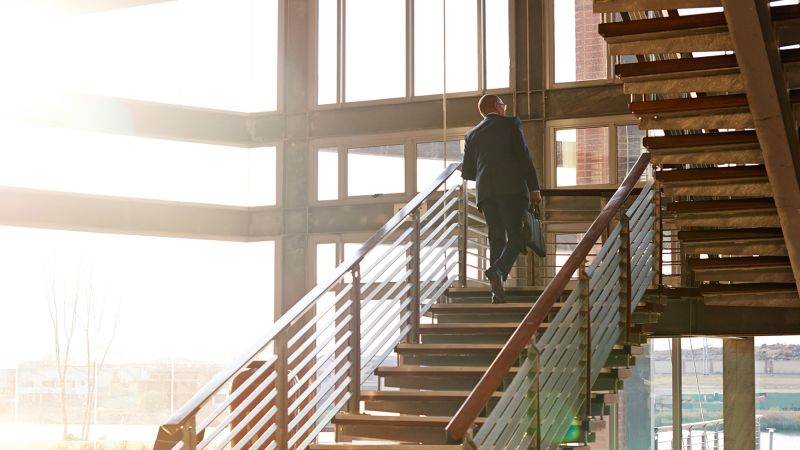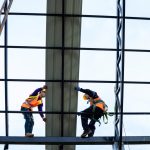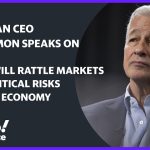A version of this story first appeared in CNN Business’ Before the Bell newsletter. Not a subscriber? You can sign up right here. You can listen to an audio version of the newsletter by clicking the same link.
Corporate America has recently, if belatedly, responded to calls to put an end to overt discrimination in the workplace. But a subtle yet pervasive racial discomfort persists in the upper tiers of the nation’s largest legal, financial and consulting firms, according to sociologist Kevin Woodson.
In his new book “The Black Ceiling” Woodson, a former attorney, sheds light on systemic issues within elite professional settings and the broader economic repercussions that come from underutilizing and marginalizing talented Black professionals.
Woodson spoke with more than 100 Black professionals about what he calls the Black ceiling — a significant barrier that impedes career progression and creates stigma and anxiety in the workplace.
Before the Bell spoke with Woodson, a professor at the University of Richmond School of Law, about how these dynamics perpetuate racial inequality and affect economic outcomes.
This interview has been edited for length and clarity.
Before the Bell: What made you decide to begin these case studies?
Kevin Woodson: It began with my own experience working at one of the largest law firms in DC. During that time, I had a lot of conversations with other Black professionals, both at my firm and at other firms and in other industries, and I was fascinated by the diversity of experiences that people shared. Even people who worked alongside each other at the same firms had such vastly different perspectives about whether their firms were fair or whether the partners they were working for were racially biased. And there were some people who were clearly superstars in the making and other people who were really struggling in ways that you really could not have predicted from how they performed in law school. I wanted to figure out why.
In your book, you bring up the idea of racial discomfort and how you think it affects Black professionals at elite firms. Can you elaborate on what that means?
Racial discomfort encapsulates the sense of unease that a lot of Black professionals experience working in elite white work settings. It consists of a stigma anxiety, which is essentially the apprehension that Black professionals face in recognizing that some of their colleagues might be biased and might treat them unfairly.
And this is in part a product of their awareness of how much racial bias exists in the world, including implicit bias. But it’s also a reflection of the conditions within these firms where so few Black people have been able to advance through the ranks. Everybody hears so many stories and rumors about specific Black colleagues who’ve been mistreated or didn’t get the promotion that they deserved, and all of that plays a factor here in putting people on notice that they need to be on edge.
That can lead to a lot of negative consequences. When people are attempting to avoid discrimination, they can end up taking themselves out of the game by silencing themselves — by not speaking up or speaking out when it would be in their best interest to do so. It makes it that much harder to impress their senior colleagues, for example, by sharing their thoughts during important team meetings. It makes it harder to build relationships with their colleagues. And it can lead to a lot of misperceptions about how intelligent they are, how enthusiastic and committed they are to the work.
What other coping mechanisms do people use to mitigate these risks of discrimination?
The main coping mechanism is what is referred to as racial reticence and that’s when people are unwilling to speak up unless they’re completely sure that everything they say is going to be well received by everyone in the room. In these firms that’s really bad because they judge you, in part, based on their impressions that they get through these meetings. It also ends up leading to people not sharing personal details about their lives with colleagues. And that can be very isolating as colleagues become friends and form these tight bonds with one another. When you don’t build those relationships in these firms, it’s that much less likely that you’re going to get access to great assignments or informal advice about how to do a good job. All the kinds of intangible resources that are so critical to career advancement.
How does this lead to a disparity in promotion or attrition rates?
Racial discomfort makes it that much harder for Black professionals to establish the relationships that are so important in these firms. Without those relationships, it’s harder to get access to the opportunities and the experiences that you need to advance. You can’t just do a good job and expect to advance on that alone at these firms. It takes sponsors, powerful senior colleagues who are going to champion your career and make sure they’re steering opportunities your way, who make sure you’re getting face time with the right clients.
Is there a wider economic impact?
There are a number of potential costs. Turnover costs for each employee are anywhere between 33% to 200% of an employee’s salary, and not including recruiting costs, the costs associated with onboarding new employees to replace them and the productivity that’s lost in the interim. That can end up costing a law firm about $200,000 to $500,000 per associate. It’s hard to quantify what percentage of turnover stems from racial discomfort, but the cost can easily amount to millions per year for firms.
Even if someone doesn’t leave, racial anxiety undermines the performance of individuals and teams, because if people are uncomfortable and they’re anxious about the possibly being mistreated, they’re going to be less likely to contribute fully.
For the employees themselves, losing out on becoming a partner at a law firm or a managing director at an investment means costs someone tens of millions of dollars over the course of a career.
Some of the people that I interviewed say that it’s demoralizing to see that firms are hiring all of these Black attorneys but not many of them are advancing to senior positions. That sends a strong message that they’re probably not going to advance either.
Let’s talk about what you call selective punitiveness and how that impacts Black professionals.
Selective punitiveness is the widespread perception that Black professionals get treated especially harshly when they make mistakes. This is something that came up in interview after interview at firm after firm. There’s just this perception, for various reasons, that Black professionals who make mistakes are a lot more likely to be written off as incompetent or not worth helping and it seems that comparable peers from other racial groups are more likely to get second and third chances to salvage their reputations. This plays a critical role in producing stigma anxiety, because it makes people that much more concerned about the possible negative consequences of making mistakes, or kind of presenting the wrong image to their peers.
So what strategies or approaches can firms use to address these issues and reduce this stigma?
A lot of this has to be top down. Firms need to train their personnel, especially their senior white professionals so that they don’t judge junior Black professionals adversely for these challenges. Awareness is a really important starting point. That would come from extending the training that they offer beyond its typical focus on bias to understanding some of these more subtle dynamics.
Firms can do a better job of monitoring the types of assignments people are getting and the types of contact they’re having with their senior colleagues. They need to make sure that people aren’t falling through the cracks early in their careers.
It’s also very important that firms address concerns about discrimination or even perceptions of unfairness because that can further contribute to racial discomfort. If junior workers come in and they see that nobody is actually advancing and succeeding that can be demoralizing. If one person has mistreated it, word of that can spread through the grapevine and it can have a ripple effect on a lot of other Black employees as well. Yeah. I don’t think firms are really aware of that.
Whether they jostled through brick-and-mortar stores or toggled between tabs and virtual carts, holiday shoppers were eager to participate in Black Friday this year reports my colleague Eva Rothenberg.
Both in-store and online retail sales increased year-over-year unadjusted for inflation, according to Mastercard’s SpendingPulse insights, which noted that apparel, jewelry and restaurant categories saw considerable spikes. In-store sales jumped a little more than 1%, while e-commerce led the charge with an increase of 8.5%.
However, Sensormatic Solutions, which tracks shopper traffic at brick-and-mortar stores, found that visits on Black Friday were up 4.6% from 2022. This is a turnaround for retailers, the company said, as foot traffic has been down an average of 2.4% this year.
“Though we anticipated an increase, in-store shopper traffic outperformed our expectations,” Grant Gustafson, head of retail consulting and analytics at Sensormatic, said in a statement. “Consumers are again finding joy in brick-and-mortar shopping, seeing it as an experience to be shared with loved ones. It’s a testament to the hard work retailers have done to streamline journeys and deliver satisfying experiences.”
Adobe Analytics, which tracks US online shopping, reported a record $9.8 billion in Black Friday sales, up 7.5% from 2022, driven by surging demand for electronics such as televisions, smart watches and audio equipment.
Many retailers and industry lobbying groups say shoplifting is at crisis-level proportions and that it’s even forcing some stores to close. But Best Buy says it has shoplifting under control.
The electronics retailer with nearly 1,000 stores says it is preventing shoplifting through higher staffing levels in stores, full-service cashier lanes, security staff at entrances and other strategies, CEO Corie Barry said Tuesday.
“In certain parts of the country in particular, there is a real issue around theft and organized crime. With that being said… we have not called out material impacts to our business as a result of shrink for at least the last two years,” Barry said on a call with reporters.
Retailers report that shrink increased 19% in 2022 to $112 billion and has nearly doubled from pre-pandemic levels, reports my colleague Nathaniel Meyersohn. They blame shoplifting and organized groups stealing merchandise from stores to resell online for the rise. (Shrink also includes employee theft, damaged products, administrative errors, online fraud and other factors.)
Best Buy has been able to stave off shrink and competition from Amazon with strong customer service support for would-be electronics buyers, analysts say, and that requires well-trained and well-staffed stores. More retailers should adopt these practices to deter shoplifting, crime prevention experts say.
Read the full article here




